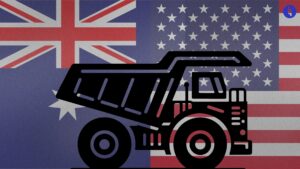When the Trump administration pulled a 180° on its Nvidia-China chip ban last month, we wondered if there’d been a deal. But we didn’t expect this: Nvidia (and AMD) can now sell certain slower chips in China in return for a cool 15% of revenues payable to Uncle Sam.
So with those early rumours now congealing into hard facts, it’s time we looked at the two wildest things about this deal, which is getting described as anything from “a mix of bribery and blackmail” through to nothing less than “the art of the deal“.
- First, what’s this deal say about US national security?
President Trump and his backers argue a) these particular US chips are obsolete, b) China was smuggling them in anyway, c) keeping China hooked on US tech slows its urgency to develop alternatives, and d) it’s better to flood the world with US tech than risk another 5G debacle (China’s Huawei famously shrugged off US curbs to lead the 5G revolution).
Stay on top of your world from inside your inbox.
Subscribe for free today and receive way much more insights.
Trusted by 146,000+ subscribers
No spam. No noise. Unsubscribe any time.
But others (including the architect of Trump 1.0’s own China strategy, Matt Pottinger) argue a) Nvidia’s H20 chips are world-class at inference (key for the AI race), b) more chips for China means less for the US, and c) there’s no real divide between US chips helping China (say) optimise its emojis, versus optimise its weapons.
Critics also argue this deal just weakens broader US export controls. How? Both by…
- Unnerving allies (what’s stopping the Dutch from allowing their chipmaking pioneer ASML to resume China sales in return for a bit of cash), and
- Emboldening foes (maybe core US interests are up for negotiation after all).
The line doing the DC rounds is… what’s next: sell the F-35 fighter jet to China if Lockheed ponies up 15%?
- Second, what’s this say about the US economy?
While President Trump and his backers argue this 15% deal ensures the US gets more of the upside, critics warn it meddles with the foundations of the US economy. How?
The deal is arguably a signal to investors and CEOs everywhere that the US runs not on clear rules, but on sweetheart deals. And maybe that’s okay if you’re a four-trillion dollar firm with White House access and a deep bench of lobbyists. But for the small firms making up 44% of the US economy? No such luck.
And regardless, the big end of town will still fret around a) whether the White House might ramp up that 15% price as profits grow, and b) who’s next (whether more firms getting hit, or more foreign capitals joining the hitting).
And that all raises some big downstream questions, like whether this all makes global supply chains even less predictable (and therefore more costly), and whether CEOs should therefore allocate even more cash to lobbying rather than innovation.
Anyway, agree or not, you can hopefully see why it’s now generating so much chatter.
Intrigue’s Take
The details are more surprising than the direction here: whether it’s Biden’s subsidy carrots, or Trump’s tariff sticks, you could argue they’re still two sides of the same industrial policy coin. Just another spooked capital burrowing deeper into more sectors.
And the president’s supporters will see here exactly what they voted for: upending the status quo, cutting the red tape, and getting a better deal. Plus Nvidia can eat that 15%: it’s already on the run of a century, and 85% of something is better than 100% of nothing.
So what’s so big about this deal? Coming after other deals like Trump’s golden shares in strategic firms like US Steel and MP Materials (with rumours TikTok is next), it arguably all nudges the US beyond industrial policy, towards what The Wall Street Journal just (amusingly) called “state capitalism with American characteristics” (ie, a la China’s model).
But there’s another big question in the way it revives a long-running debate around what DC’s end goal is (or should be) with China: is it a threat to be thwarted, a competitor to be countered, or just a peer to be persuaded? This deal arguably blurs those lines, and both friend and foe will now scramble to understand not just how, but why.
Sound even smarter:
- There was word this deal easing China’s access to US chips was a swap for US access to China’s rare earths — but China is pushing back on these claims, and there are reports it’s now actively warning its firms against Nvidia’s H20 chips.
- Legal eagles are flagging this deal potentially breaches the US constitution’s ban on export taxes.





